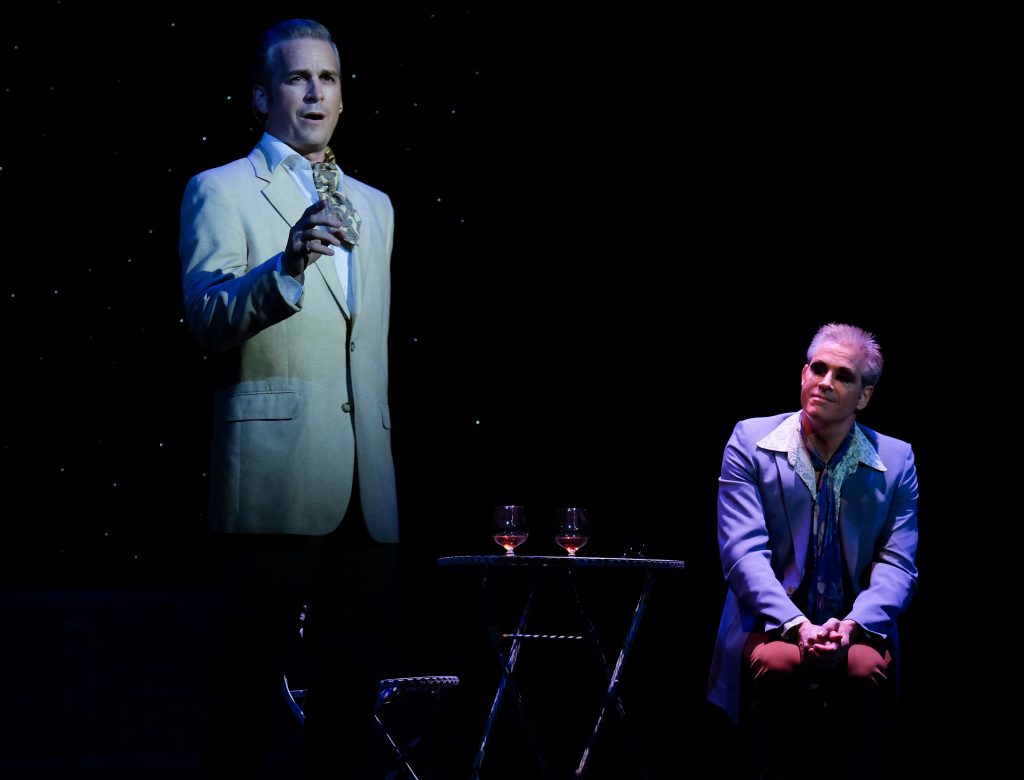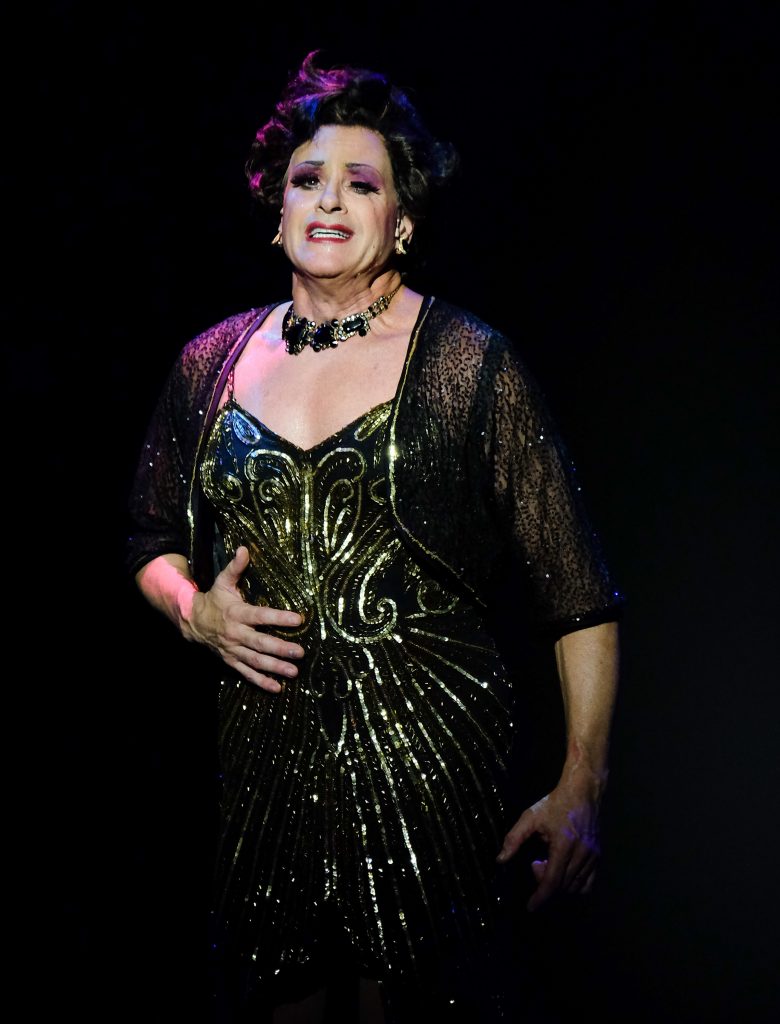The Best of Times Continue
Inspired by the 1973 French farce, which was adapted into a 1978 movie and the 1996 remake “The Birdcage,” the plot remains faithful to the original tale. In St. Tropez, Georges (Robert J. Townsend) owns and hosts the risqué drag nightclub, La Cage aux Folles. He has a loving, if dysfunctional, lifelong relationship with the star of the nightspot, Albin (David Engel who was in the original Broadway production).
Their devotion for each other is tested when Georges’ son, Jean-Michel (Bren Thor Johnson) reveals that he is getting married to the beautiful Anne (Ashley Ruth Jones). Afraid of her ultra-conservative parents, Edouard and Marie Dindon (David Mitchum Brown and Debra Wanger), Jean-Michel sets up a dinner for them to meet his folks. The catch is that Georges has to pretend to be straight and the proudly gay Albin cannot appear at the meal.
Larry Raben directs the nightclub sequences with energy that encourages hooting and hollering from the audience. The Spreckels Theatre is a perfect location for the high-spirited shenanigans from San Diego Musical Theatre, especially during the extended title song. Raben injects interactive elements as well as stunning and bawdy choreography from Karl Warden. Don Le Master’s European influenced conducting adds buoyancy to Herman’s addicting tune.
The club sequences, on Brett Young and David Medina’s swanky set, are when the “Les Cagelles” get their moments in the spotlight wearing revealing clothes from Janet Pitcher. They are often the butt of a joke (sometimes literally); however their impressive singing and dancing allows viewers to laugh with the transvestites, instead of at them.
Raben takes the many scenes outside of the club just as seriously, and the conversations between Georges and Albin feel intimate and pure. He allows the production to breathe and does not get in the way of the quieter moments between the characters.
Townsend and Engel are instantly believable as a typical couple that just happen to be gay. If the original film got a lot of laughs from the tensions between the duo, Fierstein and Herman get just as much pleasure from celebrating their loyalty. The duets between Townsend and Engel bring out the best in the performers as they display natural warmth and affection.Holding his own with the leads is James Vasquez as the butler/maid, Jacob. He has a field day with Fierstein’s prose, especially in act two since he gets to be featured in almost every scene.
Strangely, a problematic role is Jean-Michel. Although he has been portrayed empathetically on the big screen, the writers and Johnson turn him into a self-absorbed young man.
Perhaps the point was for Jean-Michel to be almost as much of an antagonist as the droll Edouard. However, it becomes difficult to care if Jean-Michel ends up married to Anne. Truth be told, the love subplot has never been the most significant part of La Cage aux Folles and this aspect does not take away too much from the narrative.
At least Johnson makes his climatic moments with Engel cause a lump in the throat. Without spoiling the ending, Jean-Michel’s resolution with Albin might make parents in the audience emotional.
An important question that should be answered is that after several decades, does La Cage aux Folles still hold up? For proof that it does, look no further than the famous showtune “I am What I am” sung by Engel. His angry, sad and ultimately inspirational rendition resonates with anyone who feels like a misfit.
The miking issues from Kevin Anthenill’s sound design did not detract from the relevant, funny and still topical new interpretation. In a year when the Supreme Court ruled in favor of same-sex marriage nationwide, this is an ideal time to reunite with Georges and Albin.
DOWNLOAD MUSICAL NUMBERS AND CAST HERE
[box] Show times are Sundays at 2:00 p.m, Thursdays at 7:30 p.m, Fridays at 8:00 p.m and Saturdays at 8:00 p.m. [/box]

A fan of theatre from a young age, David Dixon began writing reviews while in middle school, for Union Tribune’s Rated G column and sdcnn.com. He was the Entertainment Editor for SDSU’s The Daily Aztec. Currently, he contributes to San Diego Community News Network, a regional reviewer for Talkin’ Broadway, an interviewer for San Diego Theatre Reviews and has won several San Diego Press Club Excellence in Journalism Awards. David is a San Diego Theatre Critics Circle member, an American Theatre Critics Association member & Regional Theatre Tony Award voter.





After attending the Sunday, October 4th, performance of San Diego Musical Theatre’s production of “La Cage aux Folles,” I believe that the sound design by Kevin Anthenill is too loud during the ensemble production numbers. The over amplification of the lyrics during these intervals creates much distortion making them too piercing and thus difficult to accurately hear. As the Spreckels Theatre is also such an intimate venue, the volume relationship of the voices during the production numbers is also too bold relative to the music, which makes the live musicians performing onstage superfluous.
Due to this voice to music imbalance, during intermission I inquired to the sound engineer of the evening’s performance as to why they were presented thusly. The engineer’s response was that “the director specifically instructed” the musical numbers to be presented in this manner.
Rather than imparting zest and gusto to these ensemble efforts, it unfortunately made each situation seem like a dinner theater intentionally overly amplifying a performance while changing over to the dessert course in an attempt to drown out the clanging of dishes and coffee mugs. Therefore, the sound design cheapened the overall impression of this “La Cage aux Folles” production.
Although, a congratulations is indeed due to the San Diego Musical Theatre for not sanitizing the original “La Cage aux Folles” book to retain the overall bawdiness of the play and not sanitizing its content for conservatives nor children.